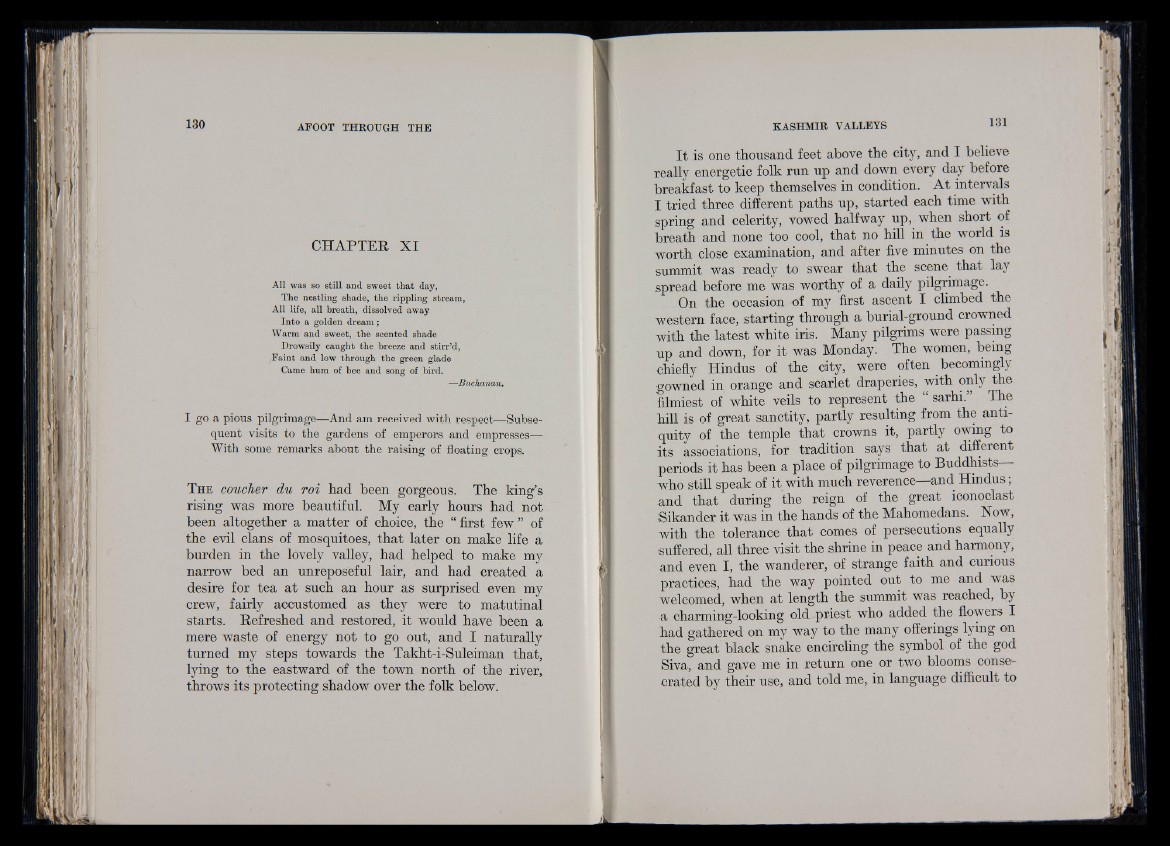
CHAPTER XI
All was so still and sweet th a t day,
The nestling shade, the rippling stream,
All life, all breath, dissolved away
Into a golden dream;
Warm and sweet, the scented shade
Drowsily caught the breeze and stirr’d,
jFa in t and low through the green glade
Came hum of bee and song of bird.
—Buchanan.
I go a pious pilgrimage—And am received with respect—Subsequent
visits to the gardens of emperors and empresses—
With some remarks about the raising of floating crops.
The coucher du roi had been gorgeous. The king’s
rising was more beautiful. My early hours had not
been altogether a matter of choice, the “ first few” of
the evil clans of mosquitoes, that later on make life a
burden in the lovely valley, had helped to make my
narrow bed an unreposeful lair, and had created a
desire for tea at such an hour as surprised even my
crew, fairly accustomed as they were to matutinal
starts. Refreshed and restored, it would have been a
mere waste of energy not to go out, and I naturally
turned my steps towards the Takht-i-Suleiman that,
lying to the eastward of the town north of the river,
throws its protecting shadow over the folk below.
I t is one thousand feet above the city, and I believe
really energetic folk run up and down every day before
breakfast to keep themselves in condition. At intervals
I tried three different paths up, started each time with
spring and celerity, vowed halfway up, when short of
breath and none too cool, that no hill in the world is
worth close examination, and after five minutes on the
summit was ready to swear that the scene that lay
spread before me was worthy of a daily pilgrimage.
On the occasion of my first ascent I climbed the
western face, starting through a burial-ground crowned
with the latest white iris. Many pilgrims were passing
up and down, for it was Monday. The women, being
chiefly Hindus of the city, were often becomingly
gowned in orange and scarlet draperies, with only the
filmiest of white veils to represent the sarhi. The
hill is of great sanctity, partly resulting from the antiquity
of the temple that crowns it, partly owing to
its associations, for tradition says that at different
periods it has been a place of pilgrimage to Buddhists—
who still speak of it with much reverence—and Hindus;
and that during the reign of the great iconoclast
Sikander it was in the hands of the Mahomedans. Now,
with the tolerance that comes of persecutions equally
suffered, all three visit the shrine in peace and harmony,
and even I, the wanderer, of strange faith and curious
practices, had the way pointed out to me and was
welcomed, when at length the summit was reached, by
a charming-looking old priest who added the flowers I
had gathered on my way to the many offerings lying on
the great black snake encircling the symbol of the god
Siva, and gave me in return one or two blooms consecrated
by their use, and told me, in language difficult to